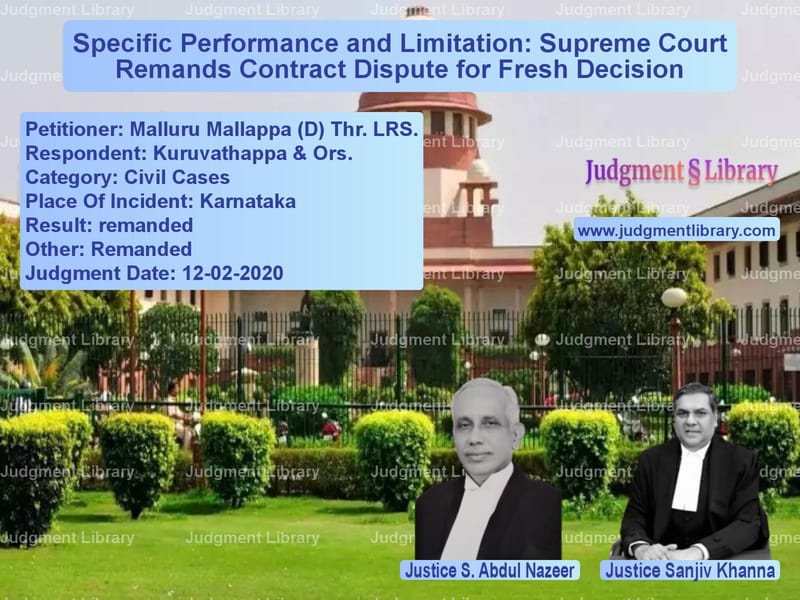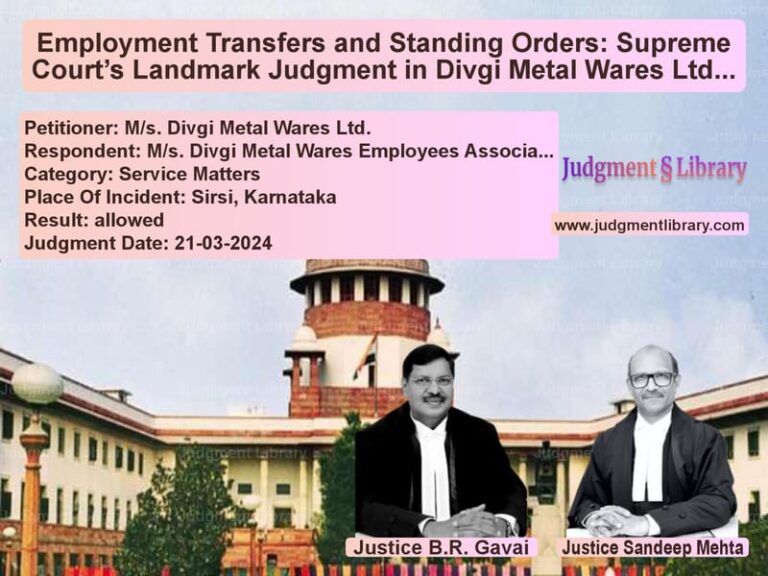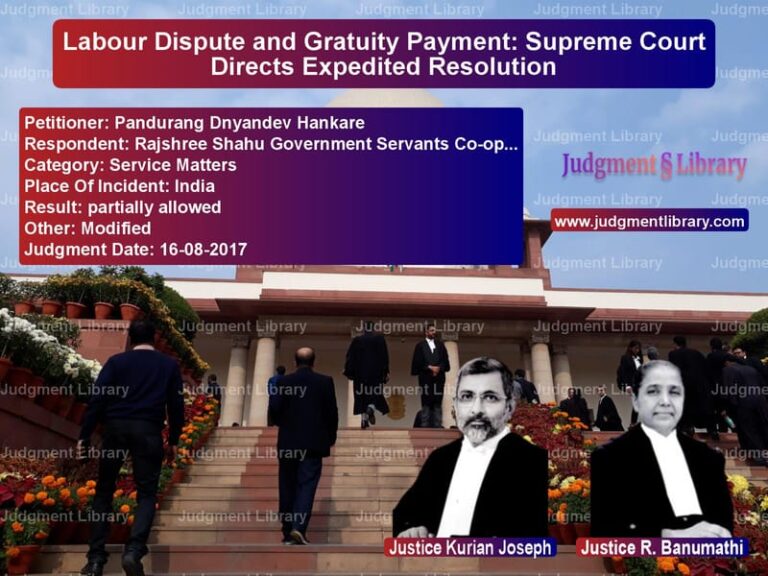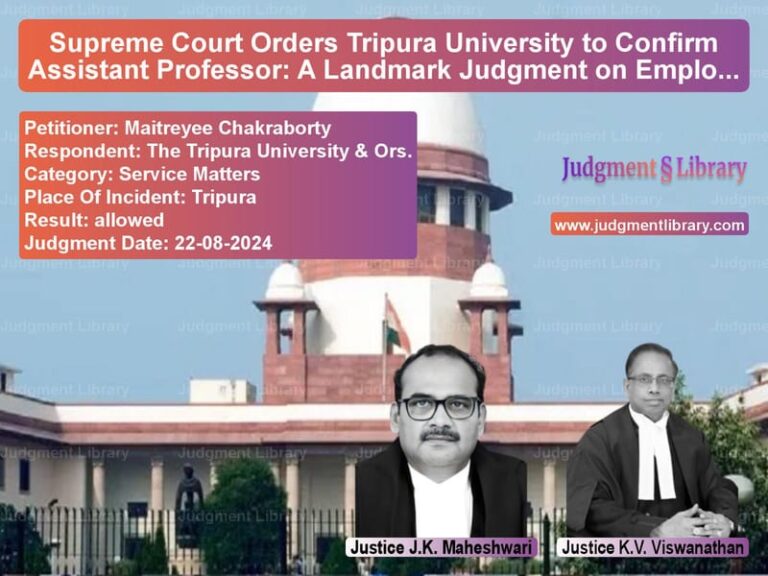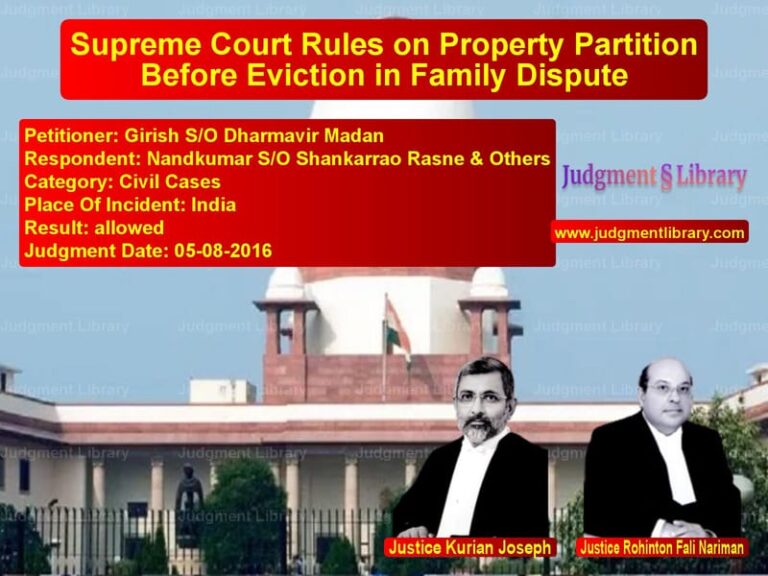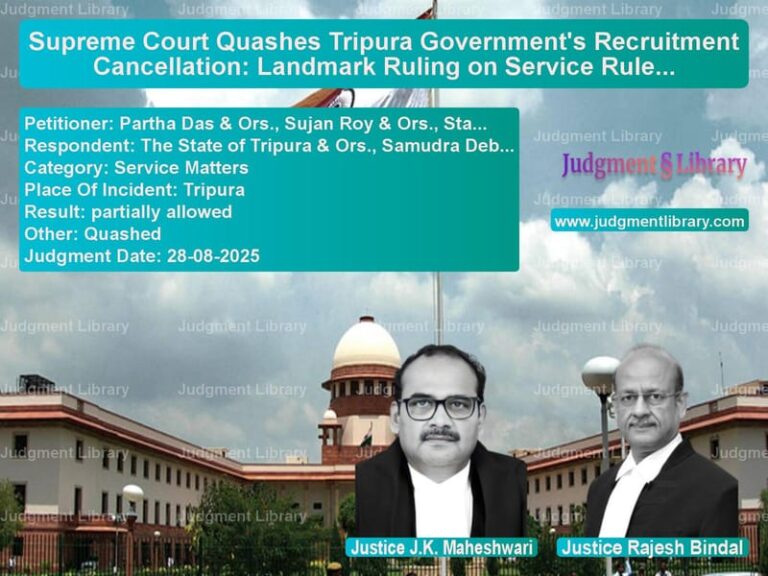Specific Performance and Limitation: Supreme Court Remands Contract Dispute for Fresh Decision
The case of Malluru Mallappa (D) Thr. LRS. vs. Kuruvathappa & Ors. deals with an essential legal question regarding the specific performance of contracts, readiness and willingness of the plaintiff, and procedural compliance in appellate court decisions. The Supreme Court’s ruling in this case clarifies how courts should assess contractual obligations and limitation periods, while also emphasizing the duty of appellate courts to conduct a thorough re-examination of facts and evidence.
Background of the Case
The case arose from a dispute over an agreement to sell dated March 30, 2000, in which the defendants agreed to sell property to the plaintiff for Rs. 2,00,000. The agreement stipulated that the sale deed would be executed within three years, subject to the fulfillment of certain obligations.
The plaintiff filed a suit for specific performance of the contract on January 28, 2005. However, the trial court dismissed the suit on the grounds that it was barred by limitation and that the plaintiff failed to demonstrate readiness and willingness to perform his contractual obligations. The High Court of Karnataka upheld the trial court’s ruling without re-examining the evidence, leading the plaintiff to approach the Supreme Court.
Key Issues Before the Court
- Whether the suit was barred by limitation under Article 54 of the Limitation Act, 1963.
- Whether the plaintiff was ready and willing to perform his contractual obligations.
- Whether the High Court erred in dismissing the first appeal without proper re-evaluation of evidence, violating Order XLI Rule 31 of the Code of Civil Procedure (CPC).
Arguments by the Petitioner (Malluru Mallappa)
The petitioner, represented by his legal counsel, argued:
- The High Court failed to reappreciate the evidence and issued a cryptic judgment that did not fulfill its obligations as an appellate court.
- As per Article 54 of the Limitation Act, 1963, the suit was filed within three years from the date fixed for performance and was not barred by limitation.
- The plaintiff was always ready and willing to perform his contractual obligations, as required under Section 16(c) of the Specific Relief Act.
- The High Court failed to apply Order XLI Rule 31 CPC, which mandates that appellate courts must set out points for determination and provide reasoned findings.
Arguments by the Respondents
The respondents contended:
- The suit was time-barred since the plaintiff waited nearly five years after the agreement to file the case.
- The plaintiff did not provide sufficient evidence to establish his readiness and willingness to execute the sale.
- The trial court had correctly dismissed the suit, and there was no need for the High Court to re-evaluate the evidence.
- The findings of the lower courts were consistent with the facts and applicable law.
Supreme Court’s Key Observations
The Supreme Court ruled that the High Court erred in summarily dismissing the appeal without a thorough re-examination of the evidence. The Court made the following key observations:
- The first appellate court must conduct a full re-evaluation of facts and evidence under Section 96 CPC.
- Failure to apply Order XLI Rule 31 CPC renders an appellate judgment legally unsatisfactory.
- The High Court did not consider the limitation period correctly under Article 54 of the Limitation Act.
- Readiness and willingness to perform a contract must be thoroughly examined before dismissing a claim for specific performance.
- A cryptic order without proper reasoning violates principles of procedural fairness.
Key Judicial Statements
The Supreme Court emphasized:
“A first appeal under Section 96 CPC is a valuable right, and the appellate court must decide all factual and legal issues comprehensively.”
Regarding procedural errors, the Court ruled:
“Non-observance of Order XLI Rule 31 CPC leads to an infirm judgment. The High Court must reappreciate evidence and provide reasoned conclusions.”
The Court further stated:
“An appellate court has the duty to re-examine the evidence on record and must provide a well-reasoned judgment addressing all legal and factual issues.”
Final Verdict
The Supreme Court set aside the High Court’s decision and remanded the case for fresh disposal. The High Court was directed to:
- Conduct a full re-examination of the evidence.
- Assess the limitation issue in light of Article 54 of the Limitation Act.
- Decide the matter in accordance with Order XLI Rule 31 CPC.
- Ensure compliance with procedural obligations when deciding appeals.
The ruling reinforces the importance of procedural compliance in appellate decisions and clarifies legal standards for enforcing contracts under the Specific Relief Act.
Petitioner Name: Malluru Mallappa (D) Thr. LRS..Respondent Name: Kuruvathappa & Ors..Judgment By: Justice S. Abdul Nazeer, Justice Sanjiv Khanna.Place Of Incident: Karnataka.Judgment Date: 12-02-2020.
Don’t miss out on the full details! Download the complete judgment in PDF format below and gain valuable insights instantly!
Download Judgment: Malluru Mallappa (D) vs Kuruvathappa & Ors. Supreme Court of India Judgment Dated 12-02-2020.pdf
Direct Downlaod Judgment: Direct downlaod this Judgment
See all petitions in Contract Disputes
See all petitions in Specific Performance
See all petitions in Property Disputes
See all petitions in Judgment by S. Abdul Nazeer
See all petitions in Judgment by Sanjiv Khanna
See all petitions in Remanded
See all petitions in Remanded
See all petitions in supreme court of India judgments February 2020
See all petitions in 2020 judgments
See all posts in Civil Cases Category
See all allowed petitions in Civil Cases Category
See all Dismissed petitions in Civil Cases Category
See all partially allowed petitions in Civil Cases Category

